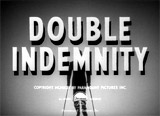
|
Double
Indemnity (1944)
In Billy Wilder's classic film noir suspense/thriller
- it was a witty, hard-boiled screenplay with a flashbacked
story, and became one
of the greatest, darkest film noirs of all time, and one of the best
films of the 40s. The cynical, witty, and sleazy thriller was about
adultery, corruption and murder. Other noirs (classic and neo-noir)
with similar themes included The Postman Always Rings Twice (1946),
Body Heat (1981), and The Last
Seduction (1994). This great film noir
received no Academy Awards, although it was nominated in seven categories,
including Best Picture, Best Director, and Best Actress.
Its brilliant script was based on the 1943 crime
novel by James M. Cain, scripted by Raymond Chandler and Billy Wilder.
In the novel, the main characters were named Walter Huff and Phyllis
Nirdlinger.
This masterpiece represented the peak of 'film noir'.
Both lead actors, Barbara Stanwyck and Fred MacMurray (both playing
against type) gave the performances of their careers, with MacMurray
providing an effective first-person narration. Although the film
had a steamy crime plot (an adulterous evil woman plotted the murder
of her husband through her association with an insurance investigator),
it was able to follow the prescriptions of the Hays Code while still
infusing the story with controversial sex and murder scenes.
The plot was told in a flashback (with a tense voice-over
narration) by the seriously-wounded protagonist - an insurance salesman
who fell hard for a blonde-wigged, sexy housewife
with a shiny anklet. The femme fatale enticed him into a
scheme to murder her husband, in order to fraudulently collect a
double indemnity accident policy pay-off. A perceptive, dogged,
co-worker insurance claims agent became suspicious and began to
unravel the case. In the uncompromising ending, the two lovers
plotted against each other and ended up trying to kill each other.
- the intriguing opening title sequence followed the
path of insurance salesman Walter Neff (Fred MacMurray) with crutches
in the middle of the night, who painfully entered a downtown Los
Angeles office building - the Pacific All-Risk Insurance Company;
he took the elevator to the 12th floor to his office, where he
began the film's haunting flashbacked narrative (mostly into a
Dictaphone recording device) - a confession dictated about a murder
and how he was implicated: ("Yes, I killed him. I killed
him for money and for a woman. I didn't get the money and I didn't
get the woman. Pretty, isn't it?")
- earlier, Neff had been shot
by a woman (and had retaliated by killing her with two point-blank
gunblasts). Would he survive before an ambulance arrived, or would
his wish for death (either from blood loss or from the San Quentin
gas chamber) come true?
- his story began with the extremely memorable, introductory
entrance of cool, enticing, pretty blonde-wigged with bangs femme
fatale Phyllis
Dietrichson (Barbara Stanwyck); the persuasive, sinister, brassy,
shrewd, predatory and dissatisfied housewife first emerged draped
in a towel on account of being interrupted while sunbathing
- at the top of a stairs landing in her Spanish-styled
Glendale, CA home, she looked down and asked bewitchingly
of smart-talking agent Walter Neff standing below her in her front
hallway during a routine call: "Is there anything I can do?"; she noted that she wasn't "fully
covered"; taking her in lustfully, he slyly joked about the Dietrichsons'
car-insurance "coverage"; she said that she didn't mind talking about the
policies: "If you'll wait till I put something on, I'll be right
down"

Pictures of Phyllis' Husband and Daughter Lola (by Her First Husband)
|

Typical Noirish Lighting - Venetian Blinds Casting Shadows
|
- as Neff waited in the living room, he noticed family pictures (of her
husband and daughter by her first husband), and thought to himself: "I
was thinking about that dame upstairs, and the way she had looked
at me... and I wanted to see her again, close, without that silly
staircase between us"
- soon after she dressed, the camera focused on her
legs (from Neff's point-of-view as he observed her approach) where
she wore an engraved, gold ankle strap on her left ankle, flashing
it at him as she came down the stairs; he also watched her exhibitionism
as she finished buttoning up her blouse and put on her lipstick
in front of a mirror

Her Gold Anklet Viewed When Descending Stairs
|

Buttoning Up Her Blouse
|
- in a classic sequence in her living room filled
with sexual innuendo, he first complimented her ("That's a honey of
an anklet you're wearing, Mrs. Dietrichson"); before speaking
about his offer of reduced-price accident insurance, they playfully
and flirtatiously engaged in a double-entendre, bantering conversation
about "speeding" and "traffic
tickets" - a driving/fast car metaphor. She coyly countered
his advances and rebuffed him: "There's a speed limit in
this state, Mr. Neff, 45 miles an hour" -
she claimed he was going 90 mph; he was immediately entranced and attracted
to her, but even early on, he understood her lethal, strangely-calculating
look and smell, thinking as he returned to his office:

|

|

|
By the Wet Window Pane - an Impulsive
Kiss
(Neff: "I'm crazy about you, baby" Phyllis: "I'm crazy about you, Walter"
|
- but as she
drifted away from Neff to leave, he grabbed her by the wrist and kissed
her, feverishly telling her:
Walter: I'm crazy about you, baby.
Phyllis: I'm crazy about you, Walter.
Walter: The perfume on your hair. What's the name of it?
Phyllis: I don't know. I bought it in Ensenada.
Walter: You ought to have some of that pink wine to go with it.
The kind that bubbles. All I got is bourbon.
Phyllis: Bourbon is fine, Walter.
- back in the living room with their drinks, Phyllis
again explained about being trapped in a loveless marriage to her
domineering and mean husband Dietrichson. She was unable to convince
the hateful Mr. Dietrichson to grant her a divorce. She married him
out of pity after the death of his first wife (who was sick for a
long time), when she served as the wife's nurse. Phyllis imagined
killing her husband in an enclosed garage by carbon monoxide poisoning

|

|

|
|
On the Sofa - Phyllis Explaining How She Was Trapped,
and Comforted by Neff
|
- Phyllis cried about her predicament as he held her
on the sofa. He put his arms around her and told her: "And I don't want you
to hang, baby. Stop thinking about it, will ya?" But Neff admitted
that he was taken by her teary-eyed seductiveness, in a flash-forward
to his dictation
- when the scene tracked/dissolved back to Walter's
apartment the same evening, it was implied that they had sex in the
interim; Neff reclined on the sofa smoking a cigarette, and
Phyllis was fixing her makeup; she
expressed her disdain about returning to her husband; Neff had already
decided to join her in scheming to kill her husband and help her
make it look like an accident - to collect on her husband's accident
insurance policy; he assured her that they were going to
do it with a brilliant, scheming plot:
Phyllis: "I hate him. I loathe going back
to him. You believe me, don't you, Walter?"
Walter: "Sure I believe you." (They kissed.)
Phyllis: "I can't stand it anymore. What if they did hang
me?"
Walter: "They're not going to hang you, baby."
Phyllis: "It's better than going on this way."
Walter: "They're not gonna hang you because you're gonna
do it and I'm gonna help you."
Phyllis: "Do you know what you're saying?"
Walter: "Sure I know what I'm saying. We're gonna do it
and we're gonna do it right. And I'm the guy that knows how."
- a kiss (and more during a dissolve) sealed the murderous
pact between them. He grabbed her tightly and dug his fingers into
her arm. Neff expressed himself with a fierce determination in his
voice, vowing that everything must be perfection
"straight down the line."
There's not going to be any slip up. Nothing
sloppy, nothing weak, it's gotta be perfect. (They kissed each
other and then he led her toward the door.) Call me tomorrow. But
not from your house. From a booth. And watch your step every single
minute. This has gotta be perfect, do ya understand? Straight down
the line.
- as she went out the door, she repeated his words: "Straight
down the line." Ultimately, she had convinced
Neff to murder her unsuspecting, boring husband (and make it look
like an accident)

Dietrichson's Step-Daughter Lola (Jean Heather)
|

Mr. Dietrichson (Tom Powers)
|
- Neff met a few nights later with Mr. Dietrichson
to sign up for the auto insurance renewal; Dietrichson's step-daughter
Lola (Jean Heather) served as a witness; Neff was able to get the
distracted Dietrichson to sign what he thought was his renewal application
for an auto insurance policy; he was easily duped and actually signed
with his second signature, a $50,000 accident insurance policy with double
indemnity provisions; in a side-plot, Lola was deceptively going
out with penniless, 25 year-old Italian boyfriend Nino Zachetti (Byron
Barr)
- the two conspirators continued to meet surreptitiously,
often talking in a supermarket over shelves stocked with groceries,
to cooly and clandestinely discuss the complicated details of the
planned murder (that was required to be on a train, so they could share
'double indemnity' accident insurance proceeds of $100,000 dollars)
and wait for the right set of circumstances to arise; it was feared
there would be a delay when Dietrichson broke his leg at work
- the nerve-wracking murder sequence occurred
as Phyllis drove her husband (with crutches and his left leg in a
cast) to the train station in Glendale, CA to travel to Palo Alto,
CA for a 4-day Stanford University annual class reunion - Neff in
the back seat reached from behind and killed Mr. Dietrichson by breaking
his neck; a camera close-up of Phyllis's unmoving, stoic, and stony
face staring straight ahead was all that was revealed during the
murder that was brutally carried out on the seat next to her
- after the murder, Neff masqueraded
as Dietrichson (with crutches), and boarded the San Francisco-bound
train, and then he jumped off the moving train shortly later
when it slowed, and rendezvoused with
Phyllis to "replace" himself on the tracks with the already-dead
husband; it was made to look like Dietrichson was killed when he fell
off the train
- and then, in one of the film's most gripping and tense
scenes, after committing the murderous crime, their car refused to
start three times as the car motor sputtered again and again for
many agonizing moments
- the police suspected no foul play, but the plan went
awry when Dietrichson's accident insurance claim went to dogged
agent Keyes for investigation; the Insurance
Company President Edward S. Norton (Richard Gaines) was unwilling to
pay and kept stating that the death was a suicide (and therefore the
company wasn't liable); the bereaved "widow" Mrs.
Dietrichson appeared in the office and criticized Norton for coldly rejecting the case
- in an unforgettable, rapid-fire speech-monologue, Keyes contemplated the suicide angle,
and rattled off suicide statistics and various ways to commit suicide
(each with subdivision categories) as he explained to Norton how unlikely it
was for someone to commit suicide by jumping off a slow-moving train;
he actually illustrated how the Dietrichson claim was probably a legitimate accident
claim: ("And do you know how fast that train was going at the
point where the body was found? 15 miles an hour. Now, how can anybody
jump off a slow-moving train like that with any kind of expectation
that he would kill himself? No, no soap, Mr. Norton. We're sunk and
we'll have to pay through the nose, and you know it")
- in another tense scene, Neff's co-worker and friend
Keyes, paid an unexpected visit to Neff's apartment; he
kept pondering to himself about how the "little
man" inside him sensed fraud (he sensed it was neither suicide
nor an accident); after their conversation, as
Keyes left for the elevator in the hallway, Phyllis ducked behind Walter's
open door to escape notice
- meanwhile, Lola met with Neff and raised his suspicions
about Phyllis, whom she accused of repeated foul play and pre-meditated murder (of her mother six
years earlier, and now her step-father) for financial gain
- Keyes kept pressing his suspicious hunches with
his fellow insurance worker Walter: "This
Dietrichson business. It's murder, and murders don't come any neater.
As fancy a piece of homicide as anybody ever ran into. Smart, tricky,
almost perfect - but...I think Papa has it all figured out";
he explained his new theory, exactly similar to the real murder
scheme, a conspiratorial scheme by Phyllis and "somebody else." He
felt that the "perfect" murder
was already coming apart at the seams: ("They've committed
a murder. And it's not like taking a trolley ride together
where they can get off at different stops. They're stuck
with each other and they've got to ride all the way to
the end of the line and it's a one-way trip and the last
stop is the cemetery"); he spoke about how the two
homicidal conspirators were on a deadly, one-way trolley "ride
together...all the way to the end of the line"
- back at the supermarket, Neff explained to Phyllis
how everything was falling apart - Keyes had figured
it all out, had an expert witness, and was rejecting her accident
claim; things were becoming strained between Neff and Phyllis, and she
was suspicious about Neff's secret meetings with Lola; he began to
imagine seeing Phyllis dead, and not riding all the way "to the end
of the line" with her

|

|
|
A Worried Encounter Between Neff and
Phyllis Back in the Supermarket
|
- the next time they met - in view of the Hollywood
Bowl, Lola told Walter that she was suspicious that an affair was
being conducted between Phyllis and her ex-boyfriend Nino Zachetti;
Lola believed they were partners in crime in the murder of her father;
Keyes even confirmed with Neff that it was likely that Zachetti was
Phyllis' accomplice, and that Neff was not the "somebody else"; Walter
phoned Phyllis and made plans to meet her that night at 11 o'clock
at her house - to get rid of Phyllis himself and have Zachetti framed
for both murders
- as the film was wrapping up, a deadly
double-cross scene took place between the two conspirators in
the darkened Dietrichson living room where Phyllis sat awaiting Neff;
when he arrived, she admitted that they were both rotten: Phyllis: "We're
both rotten." Neff: "Only you're a little more rotten.
You got me to take care of your husband for ya"
- Neff had intentions to kill Phyllis, but she upstaged
him with 'plans of her own' - to persuade Zachetti to kill Lola;
as Neff closed the window curtains, she pulled out a concealed, shiny,
metallic gun planted under her chair - Phyllis shot Neff once in
the shoulder and he taunted her to finish him off with another shot:
("You can do better than that, can't ya, baby? Better try again. Maybe
if I came a little closer? How's this? Think you can do it now?"),
but she lowered her gun and hesitated to kill him for some reason
(because of her love for him, or because of her conscience?)

|

|

|
|
In the Darkened Living Room, Phyllis Pulling Out Concealed
Gun and Wounding Neff in the Shoulder
|
- he took her gun away, and she
admitted her rottenness again and that she had used him: "I'm
rotten to the heart. I used you just as you said." But he didn't "buy" her
act that she couldn't fire a second shot because she loved him; then
during a final erotic embrace after she asked to be held close and
she surrendered to him in his arms, she drew slightly back in surprise
and fear, realizing that it was her final moment when she sensed the
barrel of his gun against her chest; Walter grimly shot her with two
point-blank gunshots at point-blank range into her chest, as he coldly
told her: ("Goodbye,
baby")
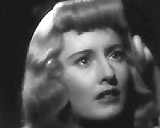
|
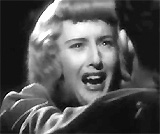
|
|
Final Erotic Encounter and Embrace -
Neff: "Good-bye, baby"
|
- after murdering Phyllis, as he left the house, Neff
had second thoughts about carrying out his frame-up of Zachetti
when he saw him about to enter the house; he told Zachetti
that he must go to the corner drugstore, call Lola, and reconcile himself
to her
- as the flashback ended, Keyes confronted Neff recording
into a dictaphone in the office building at 4:30 am; Keyes had listened
to much of Neff's confession and told him: "Walter,
you're all washed up"; Neff mentioned how Keyes' hadn't figured
out his crime: ("'Cause the guy you were looking for
was too close, right across the desk from you"); as the insurance
agent was dying slumped in a doorway, he was offered a light for
his cigarette by Keyes (a reversal of their normal relationship)
|

Walter Neff's Sweaty, Dying Confession
in His Office - Start of Flashback

Insurance Agent Walter Neff (Fred MacMurray) in Front Foyer of Dietrichson
House
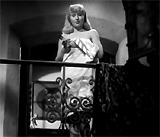

Phyllis (Barbara Stanwyck) Caught Sunbathing

Sexual Banter in Phyllis Dietrichson's Living Room While Discussing Insurance
Matters


"There's a speed limit in this state, Mr. Neff"

"How could I
have known that murder can sometimes smell like honeysuckle?"

Neff's Colleague - Inquisitive Claims Adjuster Keyes (Edward
G. Robinson): "My little man tells me"

First Instance of Neff Lighting Keyes' Cigar


Second Meeting at Her Home - Inquiries About the Purchase of Insurance
For Her Husband (Without His Knowledge)



Phyllis' Unannounced Appearance at 8 PM at Walter's Apt. Doorway

After a Transition, the Implication That They Had Sex Together (off-screen)


The Roots of a Dangerous Plan in His Apartment to Kill Her Husband
For Insurance Money

The Vow Between Them: "Straight down the line"

Mr. Dietrichson Fooled Into Signing a Car Accident Policy and a Life
Insurance Policy


A Surreptitious and Furtive Meeting Between Walter and Phyllis in Jerry's
Supermarket

Phyllis' Cold-Hearted Stare During Murder of Her Husband by Neff Hiding
in Back Seat

Neff Masquerading as Dietrichson, With Crutches

After the Murder, The Car Refused to Start

Dogged Investigator Keyes' Suicide Statistics Speech to Reluctant-to-Pay
Insurance Company President Norton
 Phyllis Hiding Behind Neff's Apartment Door in the Hallway
Phyllis Hiding Behind Neff's Apartment Door in the Hallway


Keyes Explaining His Hunches to Neff (Who Nervously Listened)
About the Conspirators

Lola's Suspicions That Nino and Phyllis Killed Her Step-Father

Walter's Diversion of Nino After Murdering Phyllis

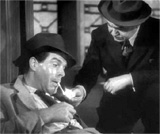
Flashback Over: A Dying Neff Confessing to Barton Keyes
in Conclusion
|




























 Phyllis Hiding Behind Neff's Apartment Door in the Hallway
Phyllis Hiding Behind Neff's Apartment Door in the Hallway




